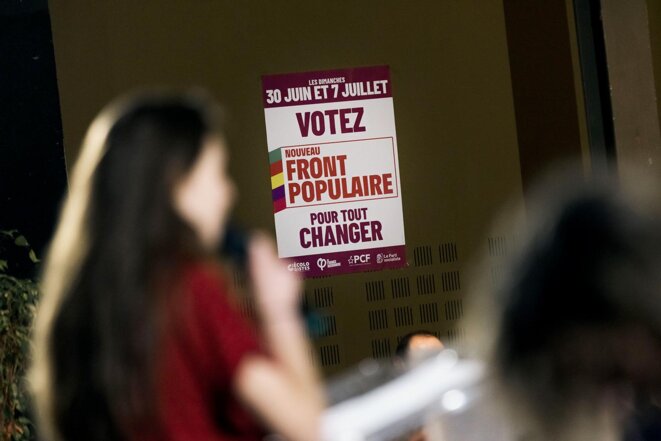French parliamentary elections : Marine Le Pen’s far-right Rassemblement National (RN) party might form a government – Undocumented Immigrants “risk being massively expelled”
The French magazine Mediapart listens to undocumented immigrants :
Link :
Snap legislative elections: Those who fear their future under a far-right French government
The decision by President Emmanuel Macron to hold snap legislative elections in four weeks’ time, a move taken on Sunday immediately after the landslide victory of the French far-right in European Parliament elections, has had the effect of a political bombshell. Not least because it now appears possible that the far-right Rassemblement National party, riding high on the results of Sunday’s poll, may gain enough seats in parliament to form a government. For some in France, that prospect has made them fearful over their future. Mediapart has been listening to their concerns.
Since the victory of the far-right Rassemblement National (RN) party in Sunday’s European Parliament elections in France, and the subsequent decision by Emmanuel Macron to call snap general elections, in which the RN is hoping to gain an absolute majority, Oumar fears the worst.
“We’ll no longer have the possibility of getting our papers sorted out,” he said. “We risk being massively expelled.” The “we” he refers to are the ‘undocumented’ immigrants who hope to one day receive legal residency and working status. Oumar arrived in France from Mali in 2017. In his thirties, living in the Paris region, he finds work on a temporary basis, most often in logistics. “We come home late in the evening, we pay contributions, but we have no right to anything if we have an accident,” he said. “But the far-right, through populism, presents us as people who want to profit from [social] aid.”

As the father of a child who has French nationality, Oumar officially applied for residence and work permits in February, but has not yet been given a response. Since Sunday evening, his concerns have heightened.
Many potential targets of a far-right government are unsure of their future. Smail, a 36-year-old Algerian, said that on Sunday evening he told himself “it was perhaps the moment to request French nationality, because afterwards the doors will be closed”. He has a renewable ten-year residency permit, has a full-time, open-ended working contract in the fibre-optic cable business, and owns a property.
Three years ago, he applied for his wife and child to be granted permission to join him in France, under the system of family reunification. “[The RN] want to put an end to family reunification,” he said. “If they do that, what will be my option? To go back to my country? Stay here like the chibanis [Arabic term for old people, here referring to North Africans who came to France for work in the post-war boom]? That’s not a life.”
A graffiti-covered Rassemblement National campaign poster for the European Parliament elections, showing Marine Le Pen and the party chairman Jordan Bardella, pictured in Paris in May 2024. © Photo Alfred Yaghobzadeh / Abaca
Abderrahim, is a Moroccan national who arrived in France in 2003 at the age of eight, after his father, already present in the country since the 1980s, applied for family reunification. Abderrahim, whose academic studies have all been carried out in France, applied for French nationality in 2021 but has never had a response since. “I already feel French, but on paper I’m not.”
He said he is “upset” at the dissolution of parliament and “to reshuffle the deck in that way, without knowing what will come about”. When asked about the possibility of a far-right government being formed in July, he doesn’t speak about his stalled demand for French nationality, but rather he fears for the immigrant inhabitants of working-class neighbourhoods (which include himself), who will suffer from the RN’s pledge to introduce priority for French nationals in accessing social housing and other benefits, and the abandoning of schemes of urban renovation. “It’s put about that their programme is no serious issue for foreigners and citizens in general – women, LGBT – but all that makes me very afraid,” he said.
Youssef (not his real name, which he asked to be withheld) arrived in France from Algeria five years ago with a student grant for higher education studies. Now in his thirties, he has a residence and work permit, is a manager and is involved in social entrepreneurship. He explained he wanted to stabilize his situation by gaining French nationality. “I will be eligible in September, but I won’t apply if the RN gains power,” he said. Since the dissolution of parliament on Sunday evening, he is now thinking instead of applying for a ten-year residency permit. He said what worried him most about a far-right victory in July is becoming targeted by greater discrimination, notably for work. “We’ll finally get to see the faces of those who vote RN,” he said wryly.
Nour (not her real name, which she asked to be withheld), 27, is French and works as a jurist. For several months now, she and her husband, an engineer, have been mulling the idea of relocating to Qatar or the United Arab Emirates. She has worn the Muslim headscarf for the past three years and said she has come across no problems where she works, which she described as a “very inclusive multinational”, but elsewhere she has been targeted by verbal insults. “We wanted to leave before 2027,” she explained, referring to the year when the next presidential elections are due in France. “We might have to get ourselves moving between now and July.” But she says she is not frightened by the situation, and claims she even “laughs about it” with her husband.
All this hate makes me worry for my own family, but it goes beyond that – all minorities can be targeted
Isabelle Marx
Coincidentally, Nour has recently been reading La France, tu l’aimes mais tu la quittes (France, you love it but you leave it), a vast sociological study of French Muslims who choose expatriation. Whereas she had for long corresponded with the description of what she herself calls “assimilated and Frenchified”, she no longer feels that she is since wearing the headscarf. Conscious of being “privileged” she regrets that some among her entourage cannot consider expatriation.
She believes that the arrival of a far-right government would lead to “the closure of our [Muslim] associations, our schools and our mosques – which has already begun”. Nour also fears the prospect of an increase in legitimized and unrestrained racist violence.
Isabelle Marx is a choral conductor based in the city of Strasbourg, in the Alsace region of north-east France. “From where comes this belief that by blocking the path of minorities something good will come of it?” she asked. Jewish, “threatened and harassed since October 7th”, and very “conscious of the force of anti-Semitism”, she says of the RN: “These parties try to paint themselves as supporters of the Jewish community, but we well know that their aim is above all to stir up hate and fear. They need a scapegoat.”
Married to a Christian and mother of five children, Marx, who has a daughter who is Muslim and a son-in-law who is Buddhist, is an ardent campaigner for inter-religious dialogue. “All this hate makes me worry for my own family, but it goes beyond that – all minorities can be targeted,” she said. “To legitimize this violence with elections is terrible.”
“In some countries like Poland, where the citizens voted for the far-right, they have come back from it today,” Marx added. “Do we have to go through that to understand that it leads to hell?”
I don’t know up until when I’ll be safe.
Chloé
Chloé, a 31-year-old transgender woman, said she was “devastated” by the dissolution of parliament. “I’m super afraid, I’ve the impression of being in 1933,” she said. “Even if the RN doesn’t obtain the majority in the [National] Assembly and Macron rises from the ashes in an alliance with the LR [conservative party], we’ll be the first to be thrown under the bus.”
At the end of May, the French Senate approved draft legislation submitted by the conservative Les Républicains (LR) party which would prohibit any hormonal treatment for those under the age of 18, and which won the support of the far-right. If the RN has a majority in the National Assembly, the lower but most powerful of the two houses, it could make it law. “At 31, I don’t think that I’m in immediate danger, but I don’t know up until when I’ll be safe,” said Chloé.
After recently obtaining a change to the gender description on her birth certificate, she now wants to include the change on a new identity card. “I didn’t plan to redo my passport straight away but I’m going to get that going.” But Chloé says that she is well aware that she’s far from being “the most affected among trans people” in France. “I’ve already begun my transition, I’m white, I have money put aside,” she commented. “I know that it can be so much worse when one accumulates racism and financial insecurity.” For her, “the number one enemy of the far-right are those who are migrants and have no legal status”, but she reckons she is “the number two enemy, or thereabouts”.
Aurélie, a 33-year-old lesbian, is going through the process of applying, with her partner, for medically assisted procreation. “We are at the beginning, there’s a waiting time of one and a half years,” she explained. A change in the law in France in 2021 gave lesbian couples and single women access to medically assisted procreation, which includes in vitro fertilization (IVF). Aurélie believes that if the RN gains power, “we can be told at any moment that that is ending […] Perhaps the RN would keep medically assisted procreation for single mothers, but us, the lesbians, we’ll be in the gunsight”. She said that if such a scenario came to pass, she and her partner would seek the treatment abroad. “To go back on an acquired right would be terrible,” she added.
Aurélie has two children from a previous lesbian relationship, one of which she carried. Since that relationship ended, she has been unable to see her son, and is involved in a legal battle to have her status as a parent recognized. She is optimistic of gaining that recognition, but she said “if the far-right get in” she fears never seeing her son again. “They can get a law adopted. They may have tried to de-demonize themselves, [but] we know who they are.”
Just several months after her election in 2022, Italian far-right prime minister Giorgia Meloni was quick to target same-sex parental couples and instruct prosecution services to take measures to remove non-biological mothers from their children’s birth certificates.
Meanwhile, in the north Paris suburbs of Seine-Saint-Denis, Fanta, a 26-year-old Ivorian woman, lives with her husband and three-month-old baby in a room in a hotel transformed into providing emergency accommodation for the social services. On the subject of the dissolution of parliament, she has no illusions about what the three can expect if the far-right form a government next month. “No-one will help us,” she said.
Nejma Brahim, Mathilde Goanec, Mathilde Mathieu and Faïza Zerouala

Leave a comment